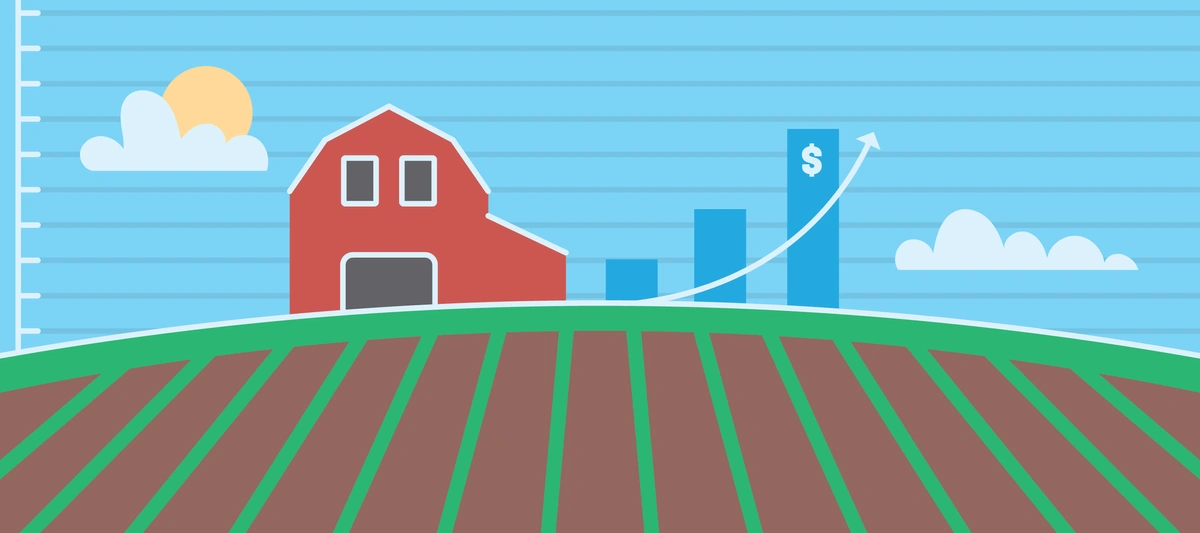How to make your farm more valuable
by Ryan Stockwell
Farmland values improve with the use of no-till

Farmland is often the biggest asset for a farm operation. The value of that farmland determines borrowing capacity, which is the lifeblood of growing operations. When that asset value falls, farmers have less capacity to take on loans. And with rising interest rates cutting into farmland values, some real estate professionals are predicting farmland, a historically stable investment, to flatline or even lose value over the next year. So how are growers to maintain borrowing capacity (asset value) while costs continue to rise?
The answer is simpler than one might expect: adopt no-till. An academic study published in the American Journal of Agricultural Economics revealed that farmland where no-till is practiced has higher value. The researchers looked at large data sets of farmland values and agricultural practices and found: “Increasing no-till adoption rates has a statistically significant positive effect on agricultural land values at the county level.” In other words, the more no-till is adopted, the more valuable land becomes.
Why is that? What is it about no-till that increases the value of the land? No-till reduces soil organic matter loss through oxidation and erosion while protecting soil carbon from loss. It also improves soil structure to increase water holding capacity as well as infiltration and drainage of excess moisture. All of this leads to improved soil productivity, meaning more bushels per acre, even in years of drought or excess precipitation.
While the study did not examine cover crops, it is easy to conclude that any practice that improves soil organic matter, water holding capacity, drainage, soil carbon, and biological activity would improve the productivity of the land—and thus its value. Simply put, carbon farming practices have not only agronomic benefits that solve challenges, but long-term benefits to farmland value.
By Ryan Stockwell, Indigo Grower Engagement Senior Manager and Wisconsin farmer
Citations
-https://www.agrinews-pubs.com/business/2022/09/14/farmland-prices-may-be-peaking-survey
-Chen et al. The impact of no-till on agricultural land values in the United States Midwest. August 2022. American Journal of Agricultural Economics: https://onlinelibrary.wiley.com/doi/10.1111/ajae.12338
This article may include information from third-party sources or other information that Indigo may not independently verify. Carbon quantification methods, processes and understandings are in their nascency and subject to change and continuous development. The information contained herein is for general informational purposes only and may be based on generally applicable assumptions that may not be applicable to any individual operation. Actual results may differ among growers and farms based on a large number of variables. Each operation should independently consider the financial implications and all potential risks and benefits of the use of any agronomic practice. Any payments under Carbon by Indigo are subject to multi-year vesting and are contingent on continued long-term maintenance of regenerative agricultural practices and soil carbon levels. All Carbon Credits generated are subject to buffer pool holdbacks required by third-party crediting; participants will not receive payments for such holdback. Neither Indigo nor its representatives or affiliates makes any representations, warranties or guarantees as to any specific outcomes (agronomic, financial or otherwise) in connection with any recommendations, calculations or predictions. Terms, conditions, limitations and eligibility requirements apply. See program agreement for additional details regarding Carbon by Indigo.
Farmers like you are getting paid to implement practices that improve soil health. With skyrocketing input costs, see how covers help.
You might also be interested in:
Neither Indigo nor any of its affiliates makes any representations, warranties or guarantees as to any specific results or outcomes, including, without limitation, with respect to soil health outcomes or any minimum amount of greenhouse gasses sequestered or number of carbon credits generated. Participation in Carbon by Indigo is subject to the terms, conditions and limitations of the program contained in the applicable enrollment agreement. Any payments under Carbon by Indigo are subject to multi-year vesting and are contingent on continued long-term maintenance of regenerative agricultural practices and soil carbon levels. All Carbon Credits generated are subject to buffer pool holdbacks required by third-party crediting; participants will not receive payments for such holdback. Not available in all areas.
500 Rutherford Ave, Boston, MA 02129 | 844.828.0240 | info@indigoag.com